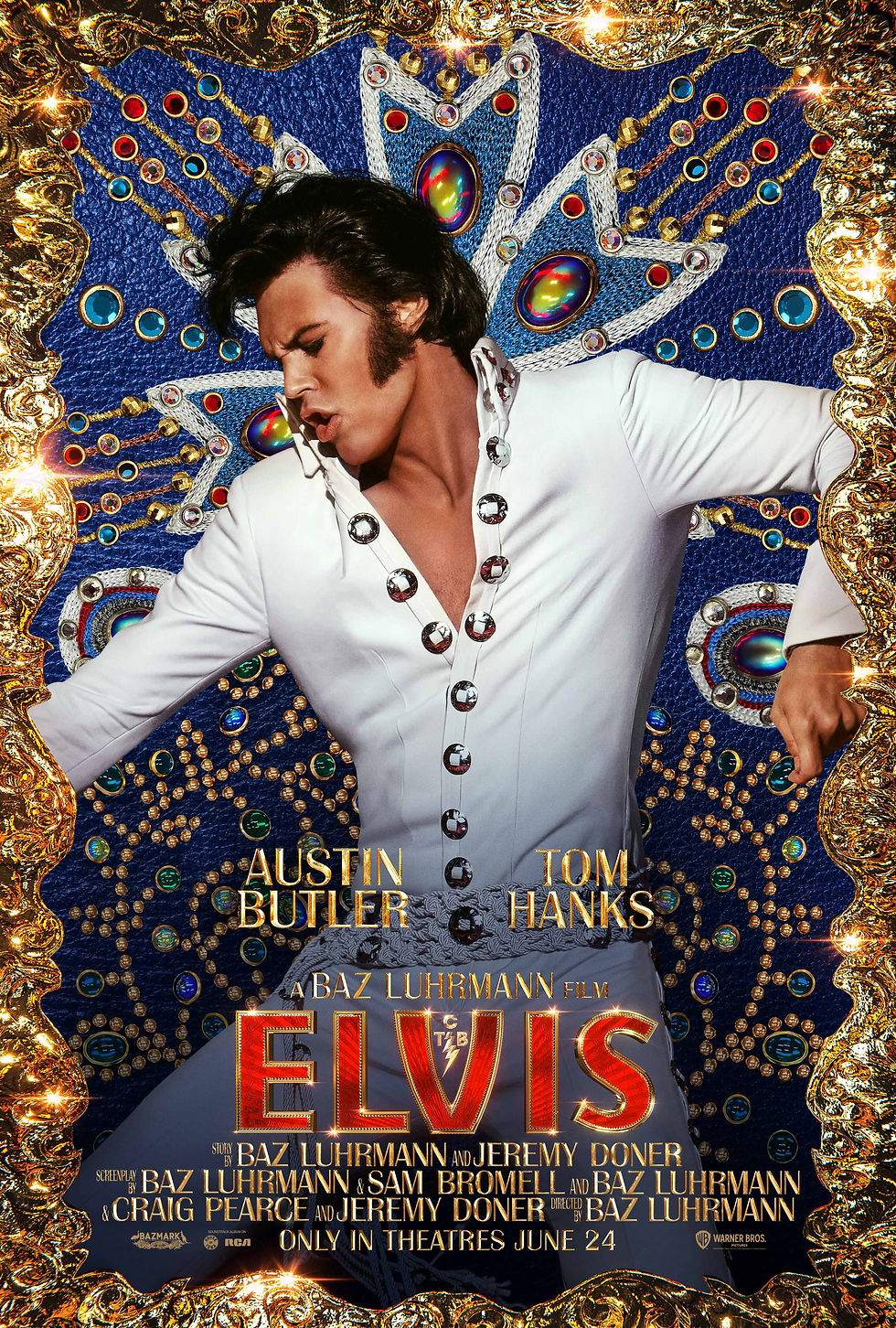Elvis Review
- Louis Saddler
- Jun 25, 2022
- 4 min read

Over the last ten years, James Brown, Freddie Mercury, Sir Elton John, Aretha Franklin, and even Dr. Dre and Eazy E. have had their lives played out on the silver screen as part of a recent run of biopics on the greatest music artists of our time. That run ensured an Elvis Presley biopic was coming sooner rather than later. Elvis, written and directed by Baz Luhrmann, delves into the life of the “King of Rock and Roll” (played by Austin Butler) with a specific focus on his time with manager Colonel Tom Parker (played by Tom Hanks).
Films about Presley have generally been made-for-TV films and mini-series, which tells you the King’s saga is a long and complicated one despite taking place within the short forty-two years he was alive. As the first theatrical release for a Presley biopic, is Elvis a film that does its subject’s legacy justice?
Despite having a talent like Luhrmann on the script and in the director’s chair, Elvis falls short of where it should be. The primary issue with Elvis is that it spends most of its 159-minute runtime as a muted, bungling mess. The first hour and a half is a struggle between Presley and Parker for whose story the film tells. It begins with Parker taking precedence in Elvis’s story to give his side of things while Elvis is the main attraction of this circus in small doses.
That debacle worsens as Lurhmann and Co. spend a good chunk of this time trying to atone for Presley’s long and well-documented history of appropriating Black culture. It’s reasonable to believe Black people genuinely influenced Presley because he grew up in two of the most soulful places on the planet, and it’s unfair to dismiss that fact. However, Elvis overplays its hand on this issue.
Luhrmann could have easily shown a young Presley moved by the sounds and sights of the juke joints and churches to make the point that he was a product of his surroundings. Instead, Elvis makes it appear that he was the chosen white man anointed by Black folks to bring our culture to the masses. Presley’s “introduction” to the Black church is shown as a Mufasa raising Baby Simbaesque moment with all Black eyes and hands on him.
More misplaced atonement comes as Elvis shows Presley caring deeply about Martin Luther King Jr., Mahalia Jackson, and civil rights in general while not offering or mentioning a single action he took to support them or the movement. If the faux allyship that followed the murders of George Floyd and Breonna Taylor were cinema, this part of Elvis would be its blueprint.
With a large portion of the film wasted on making Presley into the friend of Black America he never was, Elvis speeds through the parts of his story that humanize him or neglects them altogether. There’s little to no time spent on pre-Parker Presley aside from him being “blessed” with soul. His (pedophilic) relationship and eventual marriage with Priscilla are reduced to a few scenes, so there’s no genuine sense of their connection. No backstories or inspirations to any of Presley’s many hits.
Additionally, the excess of color, lights, dizzying cinematography, and spectacular costumes that are Luhrmann's signatures take a backseat to a more grounded but ridiculously confusing approach to the story.
It’s not until the last hour and change that Luhrmann gives us the movie Elvis should have been all the long. It’s more organized and better paced with a clear focus on Presley as the captain of this ship. Not only does Luhrmann finally dazzle with his carnival-like staples, which opens the door to seeing Butler at his best.
The charisma and naiveté Butler shows as a young Presley is spot-on for what legend says about the iconic performer and a highlight of the earlier portion of the film despite everything it did wrong plotwise. His send-ups of Presley’s dance moves weren’t mindblowing, but the believability of the live performances is still there.
However, Butler proves he’s a star in the making when he’s given more opportunities to be the focal point. As a more mature Presley, Butler is untouchable to the point where he not only comfortably goes toe to toe with Hanks in their shared scenes – he bests him. An Oscar nomination might be a reach for Butler due to the film’s early struggles, but a Golden Globe nomination is easily in striking distance.
Though I prefer his villainous turn as Professor Goldthwaite Higginson Dorr in The Ladykillers, Hanks plays Parker with unsavory perfection. The makeup and prosthetics do nothing to hide the fact that you’re still looking at Tom Hanks. What makes this role work is the slithering nature Hanks brings to Parker’s “management” that leaves a disdain for the character and everybody’s favorite everyman.
With Presley’s life, you have everything you need to make a classic musical biopic for a legend that looms as large as Presley. Humble beginnings, the rise to superstardom, hit songs, the (pedophilic) love story, the show business politics, and eventual fall are all a part of his story. Unfortunately, Elvis found a way to fail in pretty much every way because it spent too much time making Presley’s story into something it wasn’t.
A film about Presley should be about Presley. There’s room for Parker because one would not be who they are without the other, but Presley is the legend. Further, the film should present Presley as he was, a legendary White artist with Black influences. It’s ok to dispel folklore about Presley practically being a guitar-carrying member of the KKK, but making him into a politically correct celebrity fit for today’s climate is wrong.
Elvis has a saving grace in Butler’s star turn and Hanks’s nefarious one, but it’s far from enough to overcome a story that put them on a path to miss because it tried too much.



Comments